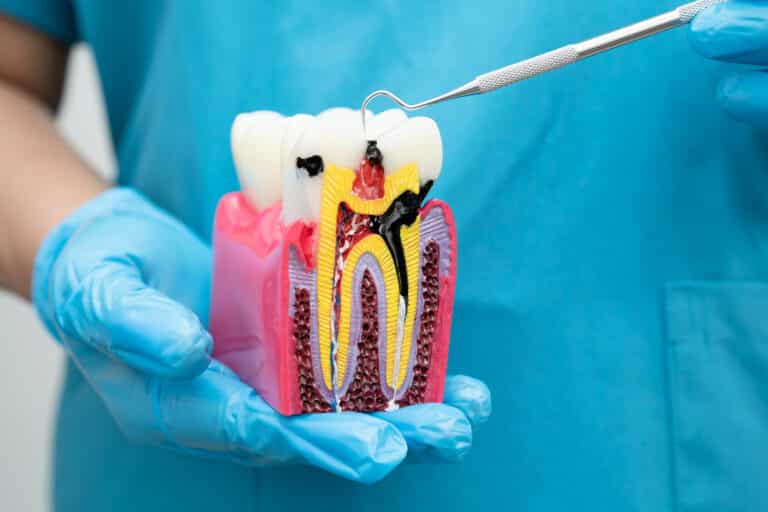As Board-Certified dentists in Harrisburg, Pennsylvania, one of the most common questions we hear from patients is, “Do I need a root canal?”
Often accompanied by worried expressions and nervous glances. Root canals have developed an unfortunate reputation over the years, but the truth is, they’re one of the most effective ways to relieve dental pain and save a natural tooth that might otherwise need to be extracted.
Let’s demystify this procedure and help you understand when it might be necessary.
What is a Root Canal?
A root canal is a dental procedure that treats the infected pulp of a tooth. The pulp is the soft tissue inside your tooth that contains blood vessels, nerves, and connective tissue. When this area becomes infected or inflamed due to deep decay, repeated dental procedures, cracks, or trauma, a root canal becomes necessary.
During the procedure, we carefully remove the damaged pulp, clean and disinfect the inside of the tooth, and then fill and seal it with a rubber-like material called gutta-percha. Finally, the tooth is restored with a crown or filling to protect it and restore full function.
Contrary to popular belief, modern root canal therapy is similar to getting a routine filling and can usually be completed in one or two appointments. With today’s technology and anesthetics, patients report that the procedure is comfortable and provides immediate relief from their symptoms.
How Do I Know If I Need a Root Canal?
Identifying whether you need a root canal early can save you significant discomfort and potentially prevent more extensive treatment. Here are common signs that might indicate you need a root canal:
- Persistent tooth pain, especially when applying pressure or chewing
- Prolonged sensitivity to hot or cold temperatures
- Discoloration or darkening of the tooth
- Swelling and tenderness in nearby gums
- A small, pimple-like bump on the gums near the painful tooth
- Cracked or chipped tooth
It’s important to note that sometimes there are no symptoms at all. This is why regular dental check-ups are crucial – we can often detect issues before they become painful problems.
Do I Need a Root Canal? Common Signs & Scenarios
You might be wondering if your specific situation calls for a root canal. While only a proper dental examination can determine this for certain, here are some common scenarios that often lead to root canal treatment:
Deep Decay
When tooth decay penetrates through the enamel and dentin layers and reaches the pulp, infection becomes likely. This deep decay often causes significant pain because it affects the nerve inside the tooth.
Repeated Dental Procedures
Multiple procedures on the same tooth can cause inflammation and infection in the pulp, necessitating a root canal.
Cracked or Broken Teeth
Trauma that results in a cracked or broken tooth can expose the pulp to bacteria, leading to infection and pain.
Abscess Formation
If you’ve developed a dental abscess (a pocket of pus that forms at the root of an infected tooth), a root canal is typically necessary to remove the infection and save the tooth.
Alternatives to Root Canal Treatment
While a root canal is often the best option for saving an infected tooth, there are alternatives to consider:
- Extraction: The tooth can be removed entirely, though this should generally be a last resort.
- Antibiotics: These can temporarily relieve infection symptoms but won’t solve the underlying problem.
- Natural remedies: These may provide temporary pain relief but won’t address the infection.
It’s worth noting that leaving an infected tooth untreated is not recommended, as the infection can spread to other parts of your body and lead to serious health complications.
The Root Canal Procedure: What to Expect
If you and your dentist determine that a root canal is necessary, here’s what you can expect:
- X-rays to examine the tooth and surrounding bone
- Local anesthesia to ensure your comfort
- Placement of a dental dam to keep the area clean and dry
- Creation of an access hole in the tooth
- Removal of infected pulp and cleaning of the canals
- Sealing the tooth with a temporary or permanent filling
- Placement of a crown for protection (often at a second appointment)
Most patients return to their normal activities the day after the procedure.
Schedule Your Consultation Today
If you’re experiencing tooth pain or any of the symptoms mentioned above, don’t wait for the problem to worsen. At Verber Dental East, we’re committed to providing gentle, effective care for all your dental needs.
Contact us today to schedule an appointment. Our experienced team will evaluate your condition and determine whether a root canal or another treatment option is right for you.
Remember, early intervention is key to preserving your natural teeth and maintaining your overall dental health.
Your comfort and well-being are our top priorities, and we’re here to answer any questions you may have about root canal therapy or any other dental concerns.




